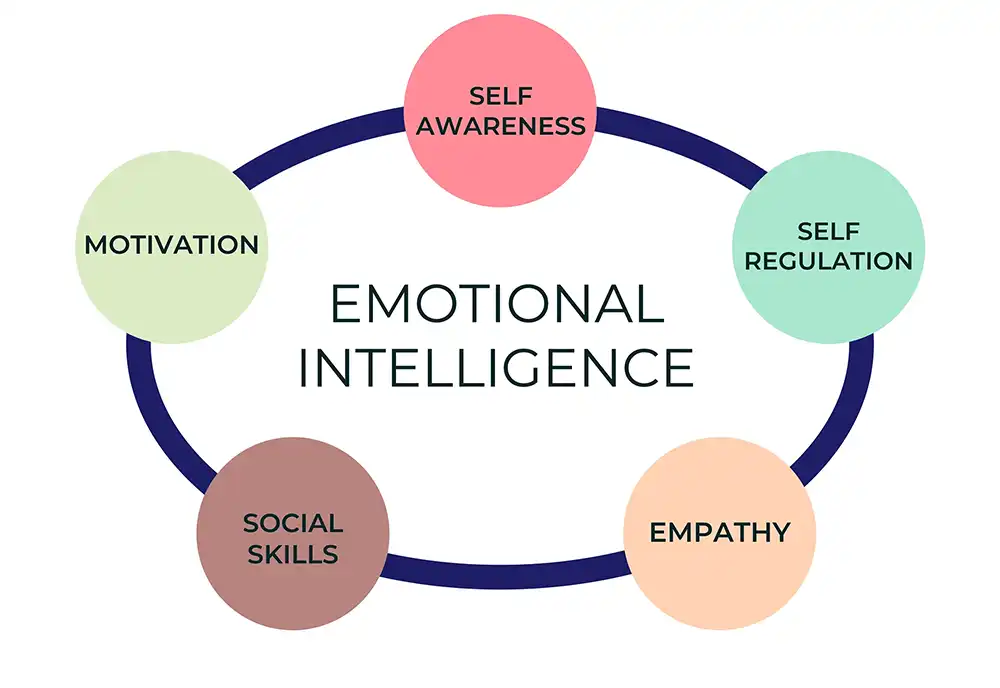Mastering Emotional Intelligence (EQ): The Key to Personal and Professional Success

Introduction
Emotional Intelligence (EQ) is the ability to recognize, understand, and manage our own emotions as well as those of others.
It is a vital skill that enables us to navigate complex social situations, build strong relationships, and achieve personal and professional success.
In this article, we will delve into the five pillars of emotional intelligence, explore ways to improve it, and highlight its numerous benefits.
The Five Pillars of Emotional Intelligence

1. Self-Awareness
Self-awareness refers to the ability to recognize and understand our emotions, strengths, weaknesses, and motivations.
A strong sense of self-awareness allows us to identify our emotional triggers, manage our reactions, and make better decisions.
Key Strategies for Developing Self-Awareness:
- • Keep a journal to record your thoughts and feelings.
- • Practice mindfulness and meditation.
- • Seek feedback from others to gain insights into your behavior.
2. Self-Regulation
Self-regulation is the ability to control our emotions, thoughts, and actions. It enables us to respond to situations appropriately, rather than reacting impulsively.
By mastering self-regulation, we can reduce stress, build resilience, and improve our overall well-being.
Key Strategies for Developing Self-Regulation:
- • Implement techniques for stress management, such as deep breathing or progressive muscle relaxation.
- • Set personal goals and create action plans to achieve them.
- • Develop healthy coping mechanisms for dealing with negative emotions.
3. Empathy
Empathy is the capacity to understand and share the feelings of others. It is a crucial skill for building strong relationships, fostering collaboration, and demonstrating compassion.
Key Strategies for Cultivating Empathy:
- • Practice active listening and fully engage in conversations.
- • Put yourself in others' shoes to better understand their perspectives.
- • Be aware of non-verbal cues, such as body language and facial expressions.
4. Social Skills
Social skills encompass our ability to interact effectively with others, build rapport, and form meaningful connections. Strong social skills enable us to navigate complex social situations, resolve conflicts, and collaborate effectively.
Key Strategies for Enhancing Social Skills:
- • Develop your communication abilities, including verbal, non-verbal, and written skills.
- • Attend networking events and engage in social activities to broaden your connections.
- • Foster teamwork by being cooperative, supportive, and open-minded.
5. Motivation
Motivation is the driving force that propels us toward our goals and aspirations. It involves setting challenging objectives, maintaining a positive attitude, and persevering in the face of obstacles.
Key Strategies for Boosting Motivation:
-
• Set SMART goals:
- ▪ Specific
- ▪ Measurable
- ▪ Achievable
- ▪ Relevant
- ▪ Time-bound
- • Visualize your success and maintain a positive outlook.
- • Seek inspiration from mentors, role models, or motivational resources.
Improving Emotional Intelligence
Enhancing emotional intelligence involves a continuous process of self-reflection, learning, and growth.
By focusing on the five pillars, you can develop a deeper understanding of your emotions and those of others, ultimately leading to improved emotional intelligence.
Benefits of High Emotional Intelligence

Individuals with high emotional intelligence enjoy numerous benefits, including:
- • Enhanced mental health and well-being.
- • Stronger interpersonal relationships.
- • Increased adaptability and resilience.
- • Greater personal and professional success.
Emotional Intelligence in the Workplace
In today's fast-paced work environment, emotional intelligence has become increasingly important. Employers recognize that EQ plays a crucial role in leadership, teamwork, and overall workplace effectiveness.
By developing your emotional intelligence, you can improve your career prospects and contribute positively to your organization.
Conclusion
Mastering emotional intelligence is crucial for unlocking your personal and professional success. By developing self-awareness, self-regulation, empathy, social skills, and motivation, you can become a more effective communicator, collaborator, and resilient individual.
Enhancing your EQ leads to stronger relationships, improved mental health, greater adaptability, and better career prospects.
